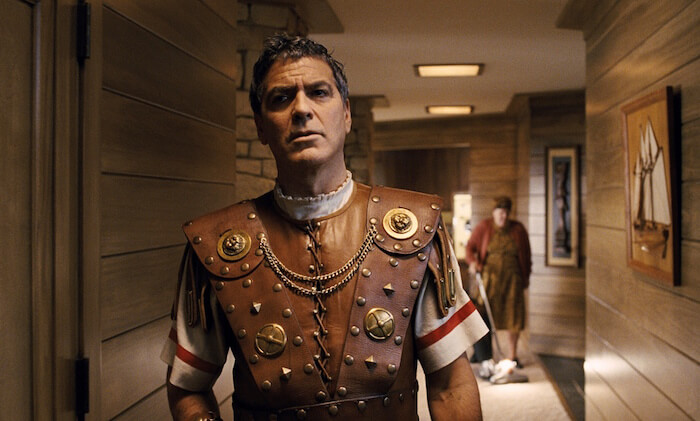Hooray for Hollywood: The Coen Brothers’ Hail, Caesar!
 Hail, Caesar!
Hail, Caesar!
Directed by Joel and Ethan Coen
Opens February 5
There’s a way in which every other Coen Brothers film—not just Hail, Caesar!—is a trip down Hollywood memory lane with a couple of wiseacre fans. Their latest film, set in the 50s, fits the bill, re-creating the behind-the-scenes of filmmaking and the clichés and genres of the films with a familiarity as snug as The Hudsucker Proxy, and the existential cosmic-joke reach that’s become a reliable feature of the Coens worldview. It’s the shuttling story of fixer Eddie Mannix (Josh Brolin), the benighted production of a Jesus picture starring Baird Whitlock (George Clooney), and swirling scandals possibly featuring some Communists, but there are also references that are fascinating for referring to an era that feels palpably over the horizon.
But before the picture really finds its engine, this is a straight-up-funny syncopated comedy about studio-run showbiz in all its bottom-line absurdity, from the aw-shucks Audie Murphy type (a perfect Alden Ehrenreich) who’s plucked from giddyap Westerns and plunked in sophisticated drawing-room romance, to Mannix gathering men of the cloth to debate how to make an inoffensive but profitable drama about the Romans and the Crucifixion. You really do enjoy the Coens enjoying little gags and homages, which fill out the mutually agreed upon fantasies of these studio pictures (and don’t feel driven by signifying production design). The cast too dive into their parts, Clooney a fine facsimile of hunky clueless star, and Scarlett Johansson as a Busby Berkeley starlet with Noo Yawk accent, and (to no avail) Tilda Swinton as gossip-column Hedda Hopper twins.
Mannix’s reflections (often at confession—he’s a sanitized version) brings us another Josh Brolin square on the cusp of some mind-blowing revelation, and the Coens, somewhat less than effectively, set up his ruminations about where to go with his life and career with a bit more grounded realism that feels fuzzy after scenes in and around the sharply drawn parodic film factory. The biggest payoff comes with Whitlock’s kidnapping, and an extraordinary convergence of Communism, Christianity, and Hollywood that seems to express some ineffable truth about the era. But you could still imagine the whole movie as a kind of extended radio show, down to that old-school sketch title.
You might also like 



















